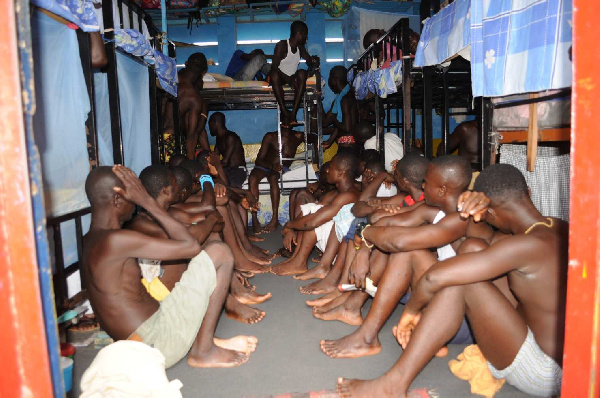
The U.S. Department of State’s 2021 Annual Country Reports on Human Rights Practices released on 12 April 2022 has said “there were not enough toilets available for the number of prisoners” in Ghana’s overcrowded and unsanitary prisons “with as many as 100 prisoners sharing one toilet”.
Also, the report said the “toilets often overflowed with excrement”.
Additionally, the report said “there were no facilities to support intersex or transitioning persons” in Ghana’s prisons.
Read excerpts of the report below:
Prison and Detention Center Conditions Prison conditions were generally harsh and sometimes life-threatening due to overcrowding, inadequate sanitary conditions, lack of medical care, physical abuse, and food shortages.
Physical Conditions: In September the Ghana Prisons Service reported prison overcrowding stood at 135 per cent of capacity, with a prison population of 13,480 compared to a total prison capacity of 9,945 inmates, a 20 per cent reduction in overcrowding from 2019. The Ghana Prisons Service held women separately from men.
Although authorities sought to hold juveniles separately from adults, there were reports detainees younger than age 18 were held with adults. Authorities held pretrial detainees in the same facilities as convicts but generally in separate cells, although due to overcrowding in convict blocks, Nsawam Prison held some convicts in blocks designated for pretrial detainees.
The nongovernmental organisation (NGO)-led Justice for All program with the support of the government continued to expedite judicial review for many pretrial (remand) prisoners, including virtually, reducing their numbers significantly.
Paralegals and civil society were heavily involved in the program.
While prisoners had access to potable water, food was inadequate. Meals routinely lacked fruit, vegetables, or meat, forcing prisoners to rely on charitable donations and their families to supplement their diet. The prisons public relations officer identified feeding of inmates as a key problem.
The Ghana Prisons Service facilitated farming activities for inmates to supplement their feeding. Authorities did not provide pretrial detainees food or changes of clothes. If community or family members were not able to provide them, prisons officers paid with their own funds.
Officials held much of the prison population in aging buildings or abandoned public or military buildings, which despite improvements had poor ventilation and sanitation, substandard construction, and inadequate space and light.
The Ghana Prisons Service periodically fumigated and disinfected prisons. There were not enough toilets available for the number of prisoners, with as many as 100 prisoners sharing one toilet, and toilets often overflowed with excrement.
There were no facilities to support intersex or transitioning persons.
The Ghana Prisons Service avoided large outbreaks of COVID-19 and other infectious diseases by designating certain facilities for new prisoners, testing the prisoners upon arrival, and putting them in isolation or quarantine as appropriate.
The Ghana Prisons Service also conducted regular health checks on prisoners and relied on donations of personal protective equipment. Medical assistants provided medical services, but they were overstretched and lacked basic equipment and medicine.
At Nsawam Prison a medical officer operated the health clinic. All prison infirmaries had a severely limited supply of medicine. All prisons were supplied with malaria test kits. Prisons did not provide dental care.
Doctors visited prisons when required, and prison officials referred prisoners to local hospitals to address conditions prison medical personnel could not treat on-site but the prisons often lacked ambulances to transport inmates off-site properly.
To facilitate treatment at local facilities, the Ghana Prisons Service continued to register inmates in the National Health Insurance Scheme. The Ankaful Disease Camp Prison held prisoners with the most serious contagious diseases. Religious organisations, charities, private businesses, and citizens often provided services and materials, such as medicine and food, to the prisons.
Although persons with disabilities reported receiving medicine for chronic ailments and having access to recreational facilities and vocational education, a study released in 2016 found that prison facilities disadvantaged persons with disabilities, since they faced problems accessing health care and recreational facilities. No prison staff specifically focused on mental health, and officials did not routinely identify or offer treatment or other support to prisoners with mental disabilities.
Administration: There was no prison ombudsperson or comparable independent authority to respond to complaints; rather, each prison designated an officer-incharge to receive and investigate complaints. Authorities suspended access to visitors as a COVID-19 health measure, although visitors could still bring food.
Independent Monitoring: The government permitted independent monitoring of prison conditions by local nongovernmental organizations, which were independent of government influence. They monitored juvenile confinement and pretrial detention, bail, and recordkeeping procedures. Local news agencies also reported on prison conditions.
Improvements: The president pardoned 1,589 prisoners to mitigate the dangers to health caused by overcrowding, particularly the risks posed by the COVID-19 pandemic: 1,555 first-time offenders who had served half their sentences, 15 seriously ill prisoners, and 19 elderly prisoners.
As a COVID-19 mitigation strategy, the chief justice directed the judiciary to reduce sentences for a range of offences to reduce the prison population. The chief justice also directed the justice sector to pursue alternatives to incarceration including fines and noncustodial punishment, especially for minor crimes.




